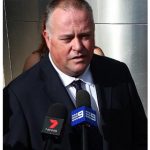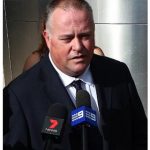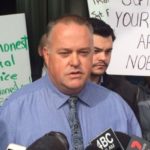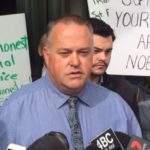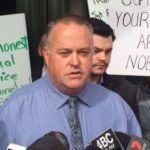Appointing Deputy Commissioner to Reform QPS Is a Mistake, Warns Whistleblower Rick Flori
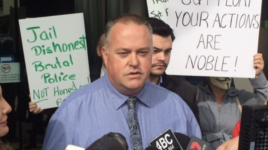
Publicly released last week, A Call for Change is a report into the Queensland Police Service response to family and domestic violence carried out by an independent commission led by Queensland Judge Deborah Richards, which has caused quite a stir.
The report not only reveals that “misogyny, sexism and racism” are rife within the QPS, which is leading to issues with domestic incident policing, but in doing so, it further found that senior management foster a culture of fear and silence, which ultimately punishes those who speak out.
Despite the commission’s focus on independent oversight to clean up the QPS via the 78 recommendations it has made, premier Annastacia Palaszczuk has turned to Queensland deputy police commissioner Steve Gollschewski to act as the special coordinator for police reform.
And this has prompted former Queensland police sergeant Rick Flori to speak out about Gollschewski’s appointment, as the well-known QPS whistleblower warns that the deputy police commissioner is the embodiment of the culture that he’s been tasked with dismantling.
Shooting the messenger
Flori understands all too well the culture of silence operating within the QPS, which sees those who expose corrupt practices “shunned and punished”, as the report puts it. Indeed, it was Gollschewski who served Flori with a disciplinary notice after he reported sexual misconduct.
In 2010, the former Queensland police officer reported a number of incidents amounting to sexual misconduct to the state oversight body now known as the Crime and Conduct Commission (CCC). But nothing ever came of it.
Rather Flori was then left to prove in court that the incident did amount to misconduct and that he should have been protected from the internal reprisals he’d since been subjected to within the QPS, under state whistleblowing laws.
This was not the end of it, however, as in 2012, Flori leaked CCTV footage of a group of Queensland police officers brutally beating upon then 21-year-old Noa Begic in the basement of the Surfers Paradise police station, whilst the innocent man was handcuffed.
Yet, despite the graphic footage of this incident continuing to be publicly available online, the only person who was ever charged with a crime in relation to it was Flori, as the father-of-three ended up in court facing one count of misconduct in public office in 2018, only to then be acquitted.
Protecting its own
But it’s not over yet for Flori. Currently, he has a civil matter before the courts set to be heard in February next year, which relates to his public interest disclosure regarding the sexual misconduct incident and the reprisals that he was subjected to following his legitimate blowing of the whistle.
And Flori relates that the QPS, including current police commissioner Katarina Carroll, is continuing in its attempts to stymie his ability to seek civil redress, despite the Queensland Court of Appeal having ruled that the agency hadn’t acted in accordance with state whistleblower law.
Sydney Criminal Lawyers spoke to whistleblower Rick Flori about the findings of the Richards inquiry, the civil matter that he currently has before the courts, and why he considers, as does the commission, that independent oversight is needed to reform the culture within QPS.
Mr Flori, given your experience as a Queensland police officer who was compelled to blow the whistle twice on police corruption, how do you consider the findings of the Richards inquiry?
The findings are welcomed. Judge Richards has really shown her independence. The inquiry was directed towards domestic violence matters, but she didn’t ignore other information that came before her.
The good thing is that she did accept the additional information and has addressed the wider issue, which also affects domestic violence. And in doing this, she’s been brave.
Her braveness comes through because there have been decades and decades of semi-independent people, including those from the judiciary, who’ve been reluctant to expose truths and issues, in particular, with the police service.
The report made 78 recommendations for cleaning up the QPS. Deputy Commissioner Steve Gollschewski has been placed in charge of overseeing the implementation of these reforms.
However, you consider his appointment problematic. Why’s that the case?
Gollschewski is, in essence, the culture of the service. He’s got 40-odd years policing service. I’m fairly sure that’s 40-odd years of solely policing, so he has no other broader perspective in terms of public perception, opinion and experiences.
He has led the service over the last decade at high rank, including having overseen the Ethical Standards Command. And from personal experience, the way in which he has dealt with my matter, shows that culture is ingrained in his methodologies.
So, having him in charge of this is a mistake. And that culture is hard to shake once it’s deeply ingrained, as it is with him.
Gollschewski served you with a disciplinary notice over your having made a public interest disclosure regarding sexual misconduct incidents.
The QPS pursued you in the courts over the matter, and on appeal, it was found that you were right in the actions you took.
Currently, you have a further legal action lodged with the courts, Flori vs Winter et al, in relation to this disclosure. What does this involve?
It involves a lot of stress, and the costs are large, in terms of personal and financial costs. I’ve had to pursue this. They’ve resisted the entire way. And it was originally driven by Mr Gollschewski.
The way they’ve dealt with the matter shows their hatred and disdain for the law and the legislation that relates to it: the Public Interest Disclosure Act, which was formerly known as the Whistleblower Protection Act.
The legislation is very specific in the way it’s written. There are lots of protections for whistleblowers.
If they read it, anyone that’s contemplating whistleblowing would think they’d be safe if they exposed misconduct.
That’s aside from their legal obligation under the Police Service Administration Act to report misconduct.
They’d think they were well and truly protected by the Public Disclosure Act. But that’s simply not the case, because the QPS, as the lead law enforcement agency in Queensland, has never complied with the legislation, as far as I am aware.
And the case you’re pursuing now is seeking compensation?
Yes. The Public Interest Disclosure Act allows two avenues, one is the criminality of it, and it has a dual ability to seek compensation for the damage caused.
The Crime and Corruption Commission is unwilling to investigate the criminality of it. They’ve written it off or ignored it.
So, I’ve pursued it civilly, to expose their wrongdoing and, as a result of that, there should be compensation associated.
In the public mind, you’re better known for having blown the whistle on the 2012 unprovoked beating of then 21-year-old Noa Begic by a group of officers at Surfer Paradise police station.
Instead of disciplining the offending officers who clearly bashed the innocent man on film, the QPS took you to court in 2018, claiming misconduct in public office, of which you were acquitted.
Both these incidents of whistleblowing resulted in the state police force turning on you. What does this tell us about the way its operating in regard to whistleblowers?
The focus was not on the Begic CCTV footage, where they’ve committed misconduct and again, criminal offences were never pursued. Instead, they’ve been attacking the messenger.
So, the Public Interest Disclosure Act, in essence, is don’t shoot the messenger, because they’re protected. They have immunity, so it can’t be a criminal offence that they can be sued for.
The QPS attitude is we don’t want anything to do with the Public Interest Disclosure Act. We don’t want to comply with that.
So, let’s attack the individual who exposes the misconduct and teach everyone else a lesson: don’t expose police misconduct because this is what will happen to you.
As you’re aware, it’s been 10 years since this all started. A decade is an excessive amount of time. I’ve been pursuing this last part since 2017, Winter et al. So, there’s five years on that alone.
They just put you in court and tie you down, so you give up.
In terms of the appointment of Gollschewski, how do you think it foreshadows the hope that the QPS will take this report seriously and implement reforms?
The first indication from the premier is that they’re not looking at an independent unit to investigate police within a day of the release of it. So, one of the main recommendations is being ignored.
Whether that has come from the government not being willing to do it, or whether it’s come from the new appointment, I’m not sure.
But it’s certainly an indication that they’re already trying to weaken those recommendations, which are vital.
And lastly, Mr Flori, in light of how you’ve observed the QPS to be operating, what do you consider would be the way to go in bringing about real change in police culture that would result in a reduction in corruption?
Because it is so entrenched, they really need to appoint independent people. I say people, not one person.
There needs to be a committee of more than one person, and that needs to be led by someone other than a high-ranking officer in the police force.
Someone with experience, skills and education, who can drive it without the direct influence of the QPS.
I can see that it needs a high-ranking police officer to be part of the process. But it certainly needs to be more independent, and it certainly needs to be more than one person.
One person can’t drive it or there is a risk of contamination. And in my opinion, it would take some time to steer the QPS in the right direction.


